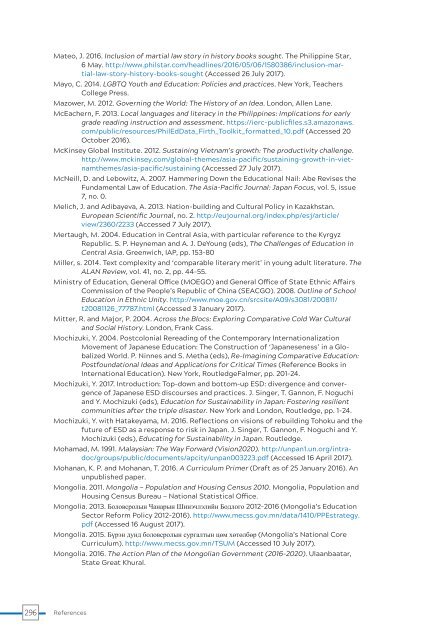Rethinking Schooling for the 21st Century
UNESCO MGIEP officially launched 'Rethinking Schooling for the 21st Century: The State of Education, Peace and Sustainable Development and Global Citizenship' in 2017 at the UNESCO General Conference. This study analyses how far the ideals of SDG 4.7 are embodied in policies and curricula across 22 Asian countries and establishes benchmarks against which future progress can be assessed. It also argues forcefully that we must redefine the purposes of schooling, addressing the fundamental challenges to efforts to promote peace, sustainability and global citizenship through education.
UNESCO MGIEP officially launched 'Rethinking Schooling for the 21st Century: The State of Education, Peace and Sustainable Development and Global Citizenship' in 2017 at the UNESCO General Conference. This study analyses how far the ideals of SDG 4.7 are embodied in policies and curricula across 22 Asian countries and establishes benchmarks against which future progress can be assessed. It also argues forcefully that we must redefine the purposes of schooling, addressing the fundamental challenges to efforts to promote peace, sustainability and global citizenship through education.
Create successful ePaper yourself
Turn your PDF publications into a flip-book with our unique Google optimized e-Paper software.
Mateo, J. 2016. Inclusion of martial law story in history books sought. The Philippine Star,<br />
6 May. http://www.philstar.com/headlines/2016/05/06/1580386/inclusion-martial-law-story-history-books-sought<br />
(Accessed 26 July 2017).<br />
Mayo, C. 2014. LGBTQ Youth and Education: Policies and practices. New York, Teachers<br />
College Press.<br />
Mazower, M. 2012. Governing <strong>the</strong> World: The History of an Idea. London, Allen Lane.<br />
McEachern, F. 2013. Local languages and literacy in <strong>the</strong> Philippines: Implications <strong>for</strong> early<br />
grade reading instruction and assessment. https://ierc-publicfiles.s3.amazonaws.<br />
com/public/resources/PhilEdData_Firth_Toolkit_<strong>for</strong>matted_10.pdf (Accessed 20<br />
October 2016).<br />
McKinsey Global Institute. 2012. Sustaining Vietnam’s growth: The productivity challenge.<br />
http://www.mckinsey.com/global-<strong>the</strong>mes/asia-pacific/sustaining-growth-in-vietnam<strong>the</strong>mes/asia-pacific/sustaining<br />
(Accessed 27 July 2017).<br />
McNeill, D. and Lebowitz, A. 2007. Hammering Down <strong>the</strong> Educational Nail: Abe Revises <strong>the</strong><br />
Fundamental Law of Education. The Asia-Pacific Journal: Japan Focus, vol. 5, issue<br />
7, no. 0.<br />
Melich, J. and Adibayeva, A. 2013. Nation-building and Cultural Policy in Kazakhstan.<br />
European Scientific Journal, no. 2. http://eujournal.org/index.php/esj/article/<br />
view/2360/2233 (Accessed 7 July 2017).<br />
Mertaugh, M. 2004. Education in Central Asia, with particular reference to <strong>the</strong> Kyrgyz<br />
Republic. S. P. Heyneman and A. J. DeYoung (eds), The Challenges of Education in<br />
Central Asia. Greenwich, IAP, pp. 153-80<br />
Miller, s. 2014. Text complexity and ‘comparable literary merit’ in young adult literature. The<br />
ALAN Review, vol. 41, no. 2, pp. 44-55.<br />
Ministry of Education, General Office (MOEGO) and General Office of State Ethnic Affairs<br />
Commission of <strong>the</strong> People’s Republic of China (SEACGO). 2008. Outline of School<br />
Education in Ethnic Unity. http://www.moe.gov.cn/srcsite/A09/s3081/200811/<br />
t20081126_77787.html (Accessed 3 January 2017).<br />
Mitter, R. and Major, P. 2004. Across <strong>the</strong> Blocs: Exploring Comparative Cold War Cultural<br />
and Social History. London, Frank Cass.<br />
Mochizuki, Y. 2004. Postcolonial Rereading of <strong>the</strong> Contemporary Internationalization<br />
Movement of Japanese Education: The Construction of ‘Japaneseness’ in a Globalized<br />
World. P. Ninnes and S. Metha (eds), Re-Imagining Comparative Education:<br />
Postfoundational Ideas and Applications <strong>for</strong> Critical Times (Reference Books in<br />
International Education). New York, RoutledgeFalmer, pp. 201-24.<br />
Mochizuki, Y. 2017. Introduction: Top-down and bottom-up ESD: divergence and convergence<br />
of Japanese ESD discourses and practices. J. Singer, T. Gannon, F. Noguchi<br />
and Y. Mochizuki (eds), Education <strong>for</strong> Sustainability in Japan: Fostering resilient<br />
communities after <strong>the</strong> triple disaster. New York and London, Routledge, pp. 1-24.<br />
Mochizuki, Y. with Hatakeyama, M. 2016. Reflections on visions of rebuilding Tohoku and <strong>the</strong><br />
future of ESD as a response to risk in Japan. J. Singer, T. Gannon, F. Noguchi and Y.<br />
Mochizuki (eds), Educating <strong>for</strong> Sustainability in Japan. Routledge.<br />
Mohamad, M. 1991. Malaysian: The Way Forward (Vision2020). http://unpan1.un.org/intradoc/groups/public/documents/apcity/unpan003223.pdf<br />
(Accessed 16 April 2017).<br />
Mohanan, K. P. and Mohanan, T. 2016. A Curriculum Primer (Draft as of 25 January 2016). An<br />
unpublished paper.<br />
Mongolia. 2011. Mongolia — Population and Housing Census 2010. Mongolia, Population and<br />
Housing Census Bureau — National Statistical Office.<br />
Mongolia. 2013. Боловсролын Чанарын Шинэчлэлийн Бодлого 2012-2016 (Mongolia’s Education<br />
Sector Re<strong>for</strong>m Policy 2012-2016). http://www.mecss.gov.mn/data/1410/PPEstrategy.<br />
pdf (Accessed 16 August 2017).<br />
Mongolia. 2015. Бүрэн дунд боловсролын сургалтын цөм хөтөлбөр (Mongolia’s National Core<br />
Curriculum). http://www.mecss.gov.mn/TSUM (Accessed 10 July 2017).<br />
Mongolia. 2016. The Action Plan of <strong>the</strong> Mongolian Government (2016-2020). Ulaanbaatar,<br />
State Great Khural.<br />
296<br />
References

















